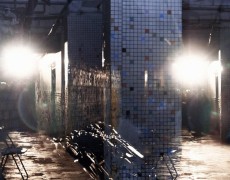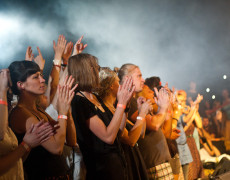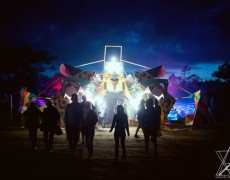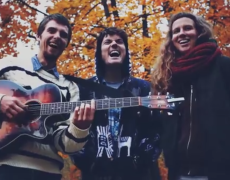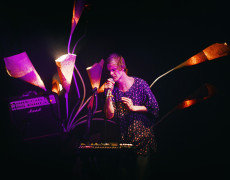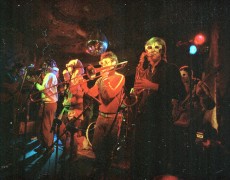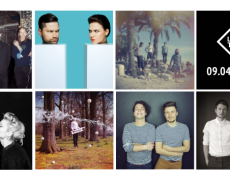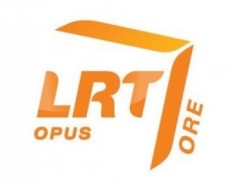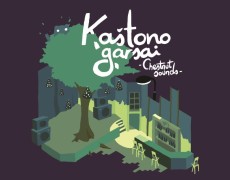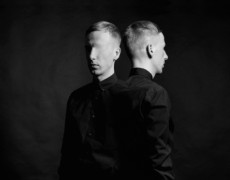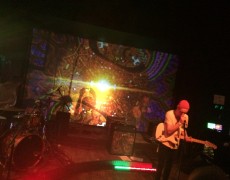‘Rocking Reggae Friendship': a talk with Ministry of Echology
I am meeting with Ministry of Echology (MOE) at Jamaika, a reggae hostel/bar in Vilnius Old Town, the day after their concert in Loftas. Memories of a fully packed Loftas, reggae tunes, a dancing wave of people and a very grateful band still linger in my mind. Although they are 10 in total, MOE acts as one; you could feel those vibrations of unity and friendship on stage the day before. While I am talking with 6 band members about the roots of MOE, the Baltic reggae/dub scene, friendship and their debut album ‘Notes & Quotes’, I only hear one voice, the one of the band as a bunch of friends.
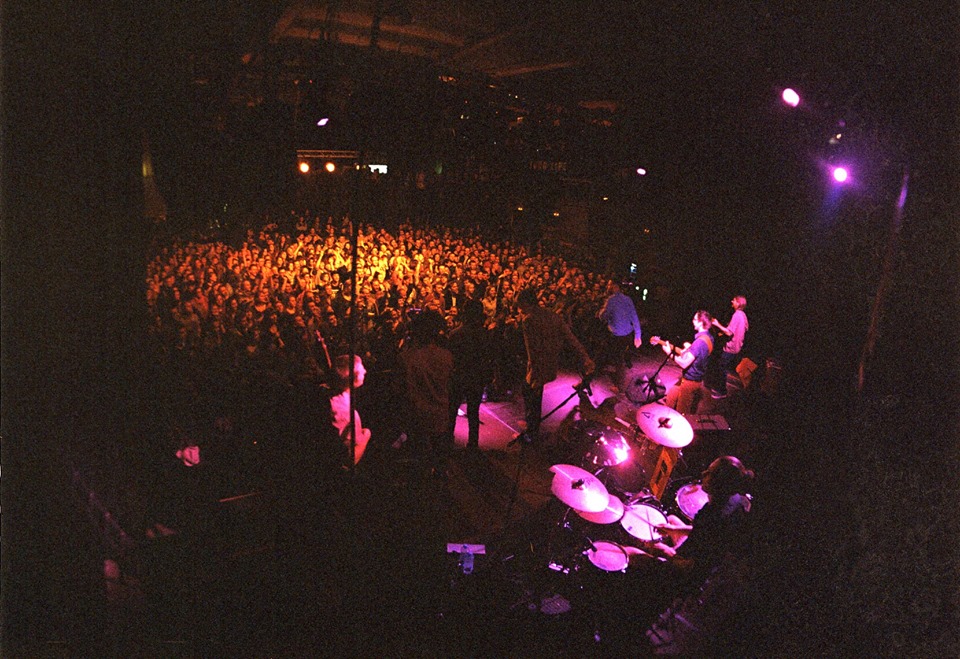
Photo: Teodoras Malinauskas
What were your previous experiences, before MOE? What was your background and how did you come into contact with reggae and dub?
There are a lot of different people in our band, so everyone has different backgrounds. Our main leader, the one who organized the whole MOE, was Eazystyle and he had a totally different background of his own. He came from hip-hop scene and he was toasting (rapping) his lyrics on the instrumental music records. He never used to play with live musicians before and his attitude to music is different than ours. Most of us came from one school and therefore had the same childhood. We used to listen to punk rock and this scene in Vilnius was our mother. We played ska. There were couple of bands before MOE and these bands were sharing the same basement where we were having rehearsals. So, after rehearsals we usually had jam sessions and I think from punk rock we went to blues, freestyling and hip-hop music. I remember that we tried a lot of different instruments. Rokas (the bass player) started to play the guitar at first and then changed to bass, but I think that everything started with punk rock and ska music.
So how did you get into punk rock and ska?
I think it was through the underground scene, Dr. Green especially. Many years ago we had a musical magazine called Ausis, which was mostly about mainstream music, but once I read the article ‘Punks not dead’ and found out that there is an underground music scene in Vilnius. That was the first time I heard about the band Dr. Green. Their music was very energetic for me. I liked the raw sound of punk rock, but I really hated the distortion effect so I was looking for a sound to express this raw music without distortion.
Also Lipnūs Macharadžos Pirštai (LMP), from the same scene, brought us to this kind of music. Similar, active people played in that band. They were the first Lithuanian reggae band. It was punk reggae, but no distortion.
Is Dr. Green still playing?
They released five or six albums back in the days and they rehearsed in the same studio as we are rehearsing now. Actually, their vocalist is a music journalist for Ore now. They were active for 12 years and they built a foundation of the Vilnius hardcore scene. ‘Ska funk rasta punk’ was their slogan. That is hardcore.lt. You can find enormous amounts of records in that scene, free for download – piles of very true, raw and natural stuff of music.
Did you ever think about sharing a stage with those people?
Once we tried to make a song with Domas (vocalist from Dr. Green), but that was very long time ago and it never happened. However, their bass player sometimes is a sound engineer of our concerts. One of them was playing with Banda Dzeta. We became friends with them, but they are not active musicians now. They are more active in organizing events. I think that they would love to play something, but nobody invites them (laughs).
Eazystyle got the band together. How did that work out? How do 10 people find each other to form a band?
There was a band called Jah Jah Tent before MOE. Back then, it was not 10, it was less and we were changing the members quite frequently. We knew Juozas (Eazystyle) – we were hosting a reggae/dub radio program together. ‘Teigiamos vibracijos’ (Positive vibrations) – still airing every week on Start FM. We did that for two years. Very nice radio – best in Lithuania.
Jamaika is a hostel/bar, but they also organize events. And every week there is some reggae event in Vilnius. If I compare that to Latvia and Estonia, I believe that they don’t have that kind of stuff..
Maybe it’s different kind of music in Latvia, which we don’t have here. There is a Latvian reggae band called Striķis, but hey play striķis (laughs). Also there are some ska bands: Voiceks Voiska and Hospitāļu iela. I think in Latvia there is more live music. In Lithuania it’s more electronic, selectors (for reggae scene) and DJ stuff. In Vilnius people like reggae and every second of us is a selector. Rokas did it last week, Dominyka and Paulius as well. We have music that we like to share, play and dance to. It’s easier to organize a party like this: you play music you like and you’re like ‘yeah, way to go – good song’. For bars it’s also easier, because they don’t need to pay 10 people to play music – it’s just one DJ who can play five hours for a beer (laughs).
These places and parties exist for a long time already?
Reggae parties happen all around Vilnius. Thursdays, Fridays and sometimes Saturdays. Like last year when there was no Jamaika, there was another yard, seven meters away from it. Now it’s a Greek restaurant, but before it was a rusty punky place, more like a drinking place, but with reggae (laughs). There was punk rock music in the basement and reggae music in the yard at the same time. I think Balti Drambliai sometimes has nice events. I think people like this music, so lot of things are happening – a place here, a place there, DJ here and DJ there. Maybe organizers think that they can draw people to the place as reggae is light music, so you can come, dance and socialize.
“I like when music speaks for itself and I like when girls sing like our girls do! It’s wonderful. Everybody contributes what they do best, we don’t have to follow some footsteps. We come from various backgrounds and have different influences. Do what you want! The music is the most important.”
In my eyes, the reggae/dub scene is more evolved in here, because I don’t know of the existence of such parties in Riga.
There is this place called Totaldobže – I don’t remember the name of the band, which played there, but it was political reggae rock or something. They also have Laba Daba festival in Latvia! We heard that this year Lee Scratch Perry will play there. I was also in a reggae concert in Riga five or six years ago – they somehow managed to bring a big name. In Positivus or Laba Daba they had artists from the Dub scene – serious big bands, foundations.
Maybe it’s more like one time events, not really a scene?
Lee Scratch Perry never came to Lithuania, but maybe we never invited him. I think everyone is afraid to invite big names to Lithuania. Nobody wants to lose money. The reggae scene is very young here and we don’t have so many experienced promoters. There is one guy in Kaunas, maybe two or three in Vilnius (including one jungle promoter, which is not a reggae promoter, but he sometimes includes reggae music in his events). Everybody is very young and I think in several years we will have a stronger scene. Yesterday’s event proved that it’s growing. Everybody’s parents came, even our fathers. So cool, crazy!
How did he like it?
He liked it! Dominyka’s dad liked it as well. Her father usually tells: ‘yeah, it was mm’. But yesterday, he said that it was good!
I was also wondering, how did you get in contact with the Estonian band Uus Energia?
It was in Tallinn, we played together and later we invited them to Tundra festival. We met them on our mini tour to Riga, Tartu and Tallinn. The concert in Tallinn was on the fifth floor of a very interesting place in Telliskivi district, namely the now closed Telliskivi Penthaus. There were Uus Energia and Bombillaz. The latter is more Eastern, Indian style reggae. They’re like the biggest Estonian reggae band.
Which bands would you like to invite to Lithuania?
Resonators! I found out this band five days ago, but they sound very nice. They’re from Brighton. Jah Shaka Sound System also from UK. Groundation from US. I like Dub Trio from New York – it’s a good band, not very much of reggae though. Dub Colossus – it’s a project from Ethiopia and UK and they have a dub orchestra. We love world music artists, like Tinariwen – I wrote them a message and I have their price, but it’s too much for me yet (laughs).
In Belgium, there is a festival called ‘Reggae Geel‘. Is there such a plan to organize a reggae festival here in the Baltics? There are festivals which invite reggae bands, but there is no reggae festival as such.
There was one, but they went bankrupt. One of the members of our band was organizing it. It was called Regeneratorius. They had big names actually, like Zion Train, Vibronics, New York Ska Jazz Ensemble, Radikal Dub Kollektiv, etc. It was like six or eight years ago, when the reggae scene in Lithuania was slow. It was the beginning of bigger festivals, they were pioneers for inviting quite huge names from the reggae scene. It was three or four stages: dj stage, world music stage, Indian music, another one was alternative (for rock and experimental) and the biggest stage was for reggae and dub. It was a good festival: nice stickers, but too little people. There was another small reggae festival Operatorine – Baltic riddim, Kosmine Odiseja and we played there. Later it merged with the jungle scene and was renamed to ‘Fire’. It happened three years ago and it was very nice! It had two stages: reggae and jungle. Lots of selectors from eight or nine countries. There were no live reggae bands, but it had live performances with laptop and some hardware.
But they don’t exist anymore?
Unfortunately no – we hope they will revive in the future. But we are glad that we have some partys and festivals with self-made sound systems. Which is also a big part of a reggae culture. Paulius has Kala Sound System with his friends. They play various music, mostly reggae, so festivals invite them to set up their sound system as a chill out or a reggae stage. There is also a younger sound system Wolde Egziabher. It’s a rasta sound system, operated by a guy with dreadlocks, who doesn’t eat meat or grapes and he doesn’t work on Saturday. True rastaman.
Which bands would you like to work with, reggae or non-reggae bands?
We already worked with one Estonian band called Uebanda, we have shared a lot of nice moments together. Their saxophone player even is on the video of LRT Opus, where he joined the brass section. We are not very much aware of Latvian or Estonian bands, should make some research. For me it’s world music! I travel a lot and I’m interested in different instruments of local people from Africa, Asia, etc. It’s interesting to meet people, to get to know their personalities. So if it matches, the genre doesn’t matter, it can be from rock to hip-hop. If the person is in the same vibration then anything can work. You see, we are not very literate about other bands. It’s more than 10 of us, so we still get to know each other. Maybe after the album it would be a time to do a tour in the Baltics and get to know the scene a little bit more. There are a lot of fine bands in Latvia. I didn’t check too much of Estonia, but it would be interesting. They have nice places in the Baltics. What’s the name of this place in Kuldīga?! Zabadaks! If you go to Kuldīga, you know you will meet nice people. Nice place, with waterfalls! It’s like an underground community, which takes care of the place. They even got support from EU or something, so they have built a nice house with a garden, where they grow their vegetables and organize concerts. People come from different parts of the town and take care of the place. In Tartu it was a very nice place to play as well, an old building of an old sports school. We played in a wooden hall, a former basketball court. It was called Genklubi. They had a nice restaurant downstairs, really cool.
Are there any Lithuanian bands you would like to give more attention to?
Garbanotas Bosistas, Baltasis Kiras. Sheep Got Waxed – they’re so good, you have to see them! They’re sick! And Insearch as well! Vygintas Kisevičius with his project Kurak. The Bus by Paulius Kilbauskas and Domas Strupinskas. No Dog Barking, but they’re not playing now. Mmpsuf! Umiko and Rok&Dom – collaborating with them every rehearsal! (laughs)
Rokas and Dominyka play as Rok&Dom and Elena as Umiko. Is it hard to combine those projects?
I don’t think so – the music is different. We only play in two bands and from my point of view, we express quite different feelings and emotions. I am doing different stuff so it’s complimentary. I feel good about it. I can play more dance music in MOE and more soft in Rok&Dom. You know, I think MOE is like rock sounding reggae, which people enjoy, because they are more into rock music. The sound from yesterday’s concert was also more like rock reggae. And it’s dub music, which is very important! People are very much into electronics these days and dub is adding this touch to our music. We are out of the hardcore scene, but we have this influence. I think people enjoy this.
You said that more and more people are getting influenced by reggae music. Do you mean that non-reggae bands are having reggae influences?
Actually, yes. Dub music influence. Reggae is kinda oldschool. Dub is also old, but it’s about innovation. ‘Silence family‘, one quite known and very serious electronic project in Lithuania have a dub influenced sound – echoes and reverb. Dublicate were the first guys that were playing dub in Lithuania. The bass player was really genius in that way.
From this younger rock scene Baltasis Kiras plays reggae from time to time. Some bands take reggae as a joke and they make funny song with funny lyrics. For them it’s like fun playing reggae, to have a joke. I think for us it’s more natural. A lot of people take reggae for ‘don’t worry be happy’ and this style came not from this. It came from suffering, frustration and fighting for freedom – it’s a quite serious movement. I don’t know if Bob Marley was even creating reggae. At first, it was not this dreadlock and marihuana style, it came through popularity long time ago. In Europe, the meaning is too much ‘la la cha cha’. We also don’t play this orthodox reggae, we are quite in the middle. It’s not about repeating. I hope we don’t sound like cliché repeating stuff. There are plenty of bands, which do it by some rules. This reggae scene in Europe and maybe all over the world is sometimes too limited. It’s not very open. If you want to be with them, then you have to sing what they sing and it’s not very open. I’m in reggae because I’m into the music and for me the first genre that I loved was dub. When I was searching for dub music, I didn’t know what it was, I only knew how it sounded. I went into the shop (I lived in New York at that time) and I asked: ‘You know this music, which is like reggae, but nobody is singing?’. And then I got all dub music. I like when music speaks for itself and I like when girls sing like our girls do! It’s wonderful. Everybody contributes what they do best, we don’t have to follow some footsteps. We come from various backgrounds and have different influences. Do what you want! The music is the most important.
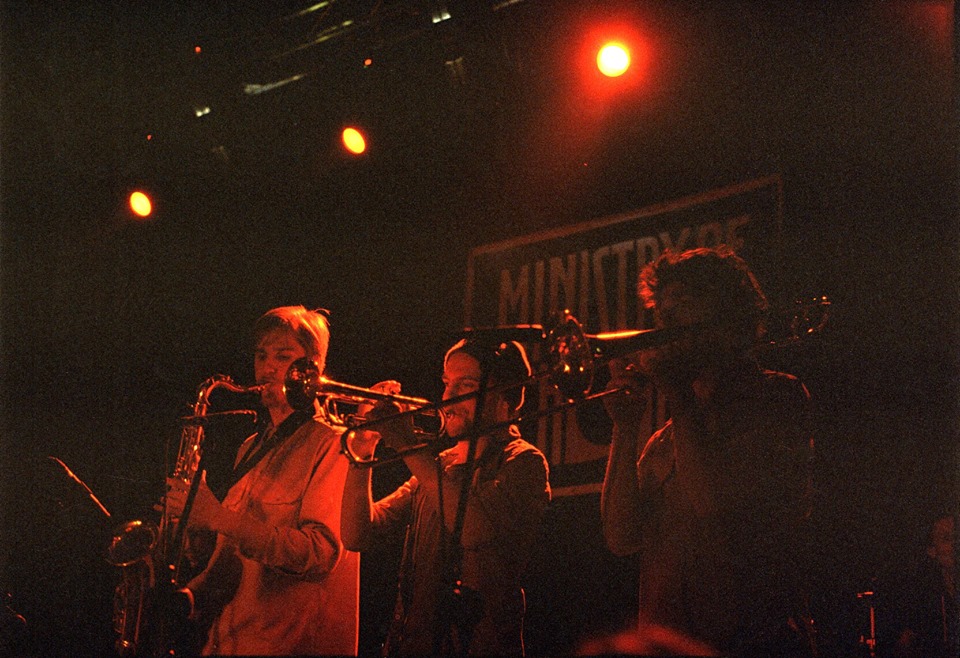
Photo: Teodoras Malinauskas
Is the music that you make a spiritual experience?
It’s quite deep. I once called it ‘dancing meditation’. Sometimes it goes like that. The thing is about the feeling. How do you feel while you are playing and what do you spread with this music. The word ‘meditation’ has too much weight, maybe. I think it’s better to define it as a nice vibration. We get into this music feeling quite deep when we play together. We don’t take it superficial, but we play truly. We enjoy doing it and we enjoy sharing this feeling with each other as much as possible. And this makes it very human and very heartly. And that makes it spiritual indeed. For example, after the concert yesterday, I was feeling so overwhelmed with positiveness and love and this unity how all people were enjoying and dancing together. Everyone was smiling, it’s a really deep feeling. Not spiritual like in the way of rasta or in the way of meditation. It’s too much of misunderstanding in these words. For us it’s more simple and natural, just being, enjoying and sharing.
“I feel that our music is ‘rocking’. Not like rock’n’roll, but rocking when you’re dancing like a monkey on stage, like Dominyka did yesterday. I feel it rocking! Rocking friendship, it rocks me and everybody else around me!”
In the band we don’t talk about philosophy. We come together and just play. We don’t talk too much. From my point of view, the philosophy can separate a lot of people. One person thinks in one way, the other thinks in a different way, but they both dance, enjoy and live in the same way. We use some concepts of philosophy, but it’s not the main thing. We don’t preach any truths! It’s nice to be together and if some people enjoy when we are having a nice time together then it’s crazy!
Do you feel that people conceive your music in a “la la la” way? What surprised me a lot yesterday was that you were clapping a lot yourselves, for the audience. And it looked like you were so grateful, both towards each other as towards the audience. And that was a truly honest experience to see. Maybe people don’t see it in that way?
It depends on the people. It does matter how people look at us but it’s not our concern. It’s our concern to be honest and if people can see this honesty, it’s good for them. If people look it in any other way, it’s also good for them. We don’t have any expectations of what people should see in our music. See whatever you see, enjoy! We just do it honest and really being grateful. This feeling of gratefulness is really important. People come to the concert and give so much love. How can you not be grateful for that?
During the concert you were all dancing. How do you look at the relationship between the lyrical and the instrumental part of your music?
It supports each other. They express the same thing in a different way. In our band, the vocal parts began as instruments. Dominyka and Elena were back vocals for nobody. Now we have texts, but before it was only some little sentences that came out. It was like: ‘Oo, it sounds pretty good, the meaning is nice, so ok’. And now we got more words and more time to sing!
You still consider your voice part as an instrument?
Yes! Normally, in music, lyrics are the main thing. But I don’t see our singing as the thing that you should consider as the most important. Everything is one big bowl, being mixed and mixed. What I feel and hear at the concert is that the singing part and the melody that goes with the voice is most of the time like an instrument. It is because almost all of our texts are English. Even though people understand English, it is still more difficult to get the text and melody than if it was in Lithuanian. So I look at it and I hear it as an instrument.
But we have meaningful texts as well and that is not always heard. There are things that we want to say, but sometimes I think they don’t reach the people’s ears as a text or a message because it is English and it’s hard to grasp all the things that are being said. The key phrases that we have in the texts, the chorus, these are the key lines, they summarize. It’s up to the listener how to interpret these lyrics. For me it’s a message of enjoying the moment, being together, love, being free at the moment.
I don’t even think people listen to the lyrics sometimes. They hear the words as some sounds. ‘Man taip patinka’, for example, but if you’re not Lithuanian, it’s just a combination of sounds. Maybe when we release another album we will write down all the lyrics. Working on it would be nice, because we would like people to understand it.
Some reggae songs has very strange and cruel lyrics. I was dancing to a song and Paulius comes and asks: ‘do you hear the lyrics of this song?’ And that was a complete thing I’m against, nice song but no dancing anymore!
In Lithuanian it’s easier to reach audience with Lithuanian lyrics. Baltasis Kiras sings in Lithuanian so everybody understands, even though their lyrics are sometimes crazy. When you sing in English, the text becomes an instrument and melody. Juozas (Eazystyle) has this two or three songs in Lithuanian which reach deeply, like, Kasdienybės šventykla and Ilga diena. But you can sing English and everyone can get it, like ‘I met one nice boy in Vilnius city’, it’s Dominyka’s love story. It’s so pure, so nice, so raw. Once I met a boy, he was so pretty – WOW, genius! It’s international. Clear message (laughs)!
You started out in 2009. Could you describe those five years in one sentence? What was the key word in those five years?
Friendship! It’s just the foundation of our band: we are just being friends. During all these years, we traveled a lot and we are still friends. I see this as the most important word for these five years. I feel also that our music is ‘rocking’. Not like rock’n’roll, but rocking when you’re dancing like a monkey on stage, like Dominyka yesterday did (laughs). I feel it rocking! Rocking friendship, it rocks me and everybody else around me!
Why the production took so long?
We started to record almost two years ago. The base was made two years ago. During that time, we had to rerecord some guitars, some vocals, some percussions, etc. Extra brass, extra vocals for specific songs. We were not sure what do we want to do with those records. I think it took us a year to figure out that we wanted to do it all by ourselves. And when we decided, it took another half a year to make a studio for this, to get stuff, to learn and then it took time to do it. Also there was the period that people were traveling and we couldn’t get together. During these years, we got lots and lots of good experience. So for the next album, which will come soon, I hope we will do less mistakes. This was a lack of experience. We were idealizing all the stuff. To tell you the truth, it’s not that ideal, it takes a lot of work. You have to do a lot of stuff. Ten people it’s a lot of opinions of what we want to do. That’s why we’re a great band, it only took us two years to do so (laughs). I don’t know if I should say this, but the album was given to be pressed without musicians having a listen. Elena heard the album here in Jamaika on the dance floor for the first time. It’s a really fresh thing!
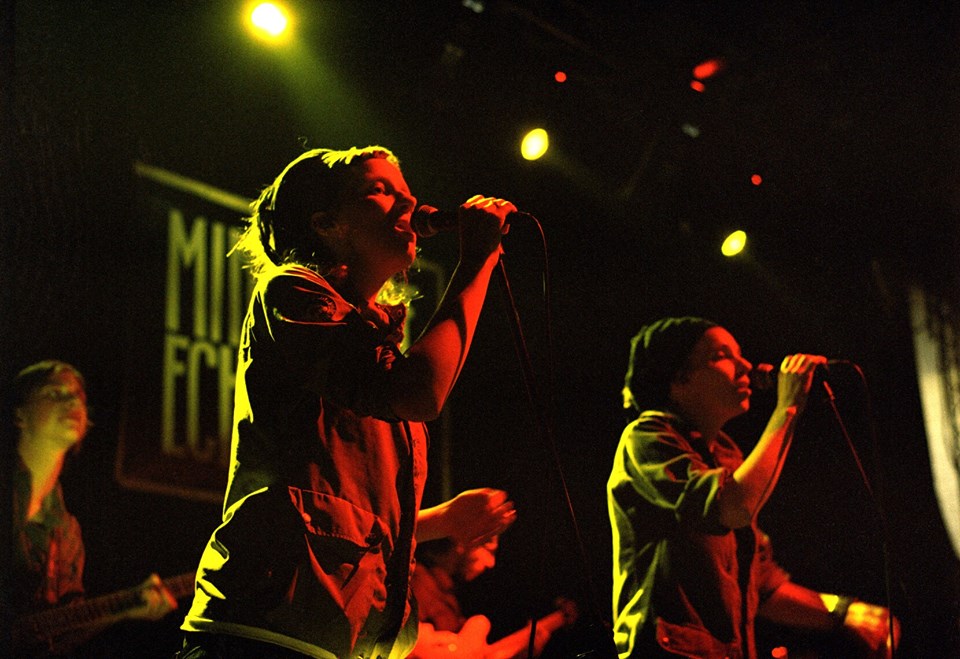
Photo: Teodoras Malinauskas
How did you like Loftas yesterday? Any special stories?
We liked the people! And the stage as well! It was big so we had a lot of space to move, that’s nice. Normally we don’t have that much space (laughs). A big thanks to everyone! Thanks thanks thanks!
And now you will start touring.. How are you looking forward to that?
In Loftas we played for two hours! It was a long concert, but it was cool. I think we made it dynamically very nice. It’s hard to play for two hours without stop. It was a retrospective: old tunes, album tunes and new tunes. Here in Vilnius, we have a lot of friends as we live here. So it’s nice that a lot of friends came yesterday. It will be a bit more challenging going out of Vilnius. I think we’re really looking forward in making as much friends there as here in Vilnius.
It was a surprise that we will play in the Festival of Europe. We got more concerts on the way: Warsaw in Poland, Berlin in Germany. The clubs plan their program half a year in advance, so it’s hard to find gigs so fast, but we guess we also will play on the streets. Sometimes it’s even better. We’re all very excited and looking forward to the tour!
▲ ▲ ▲
Find Ministry of Echology on Facebook, on their website and on Soundcloud
Go and see Ministry of Echology this Thursday, the 8th of May, at Vasaros Terasos! Join the event here!
▲ ▲ ▲


